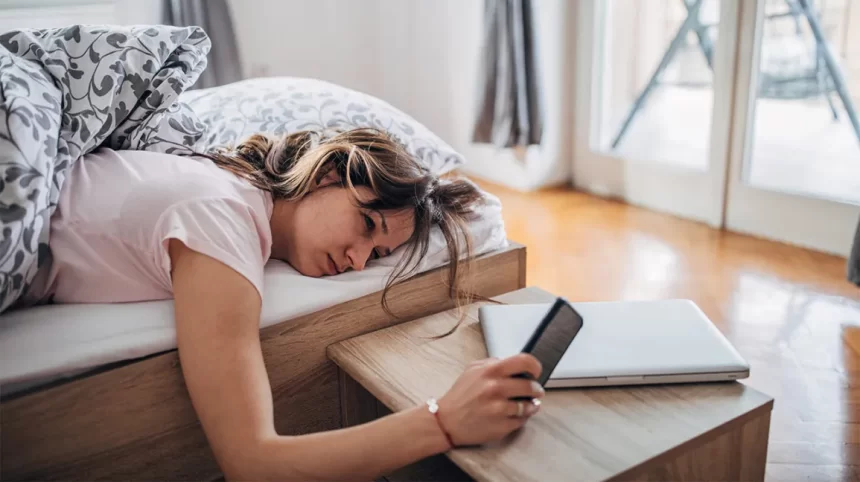It is a common belief that if you exercise too close to bedtime, it could hinder your sleep. The theory is the strenuous physical activity could cause your heart rate and body temperature to rise — both which can take longer for some people cool off. However, recent research calls this conventional wisdom into question as short bursts of resistance exercise in the evening might actually increase sleep duration without negatively affecting other aspects of sleep.
The study, published in the BMJ Open Sport & Exercise Medicine on Thursday provides a new angle on how we might improve our nightly sleep–and by extension our long-term health–with just a few minutes of exercise to finish off the evening.
The Study: A New Take on Evening Exercise
The findings, published by researchers who are investigating the effects of evening exercise on sleep after studying 30 non-smoking adults aged between 18 and under-40. Lab study of ‘activity breaks’ for sedentary workers With all of them spending long hours sitting during the day, these men were participated in a controlled lab experiment to assess how small “activity breaks” would influence sleep.
This study was performed across two 4-h sessions beginning at ~17:00 h on different days. During one session, they sat still for the entire half hour. In one, the men sat for 6 hours during work days but stood up and walked stairs slowly for 3 minutes every half hour In other words chair squats calf raises standing knee raise etc. The findings were eye-opening: Overall, the activity-break participants slept an extra 27 minutes a night over sedentary people.
If you want something to switch up in your night routine — try doing it with resistance bands or light dumbbells. TRX and Bowflex are good examples of brands with small, accessible equipment for brief home workouts.
Understanding the Benefits
Several implications stemmed from the findings of this study. The first is that brief, low-impact evening workouts may actually be helping you sleep longer. The second? The activity-breakers tended to go to bed at around the same time as those who sat but sleep in longer, with fuller nightly rest: They averaged almost half an hour more of slumber than the passive participants. What was crucial to note is that the additional sleep was not achieved by sacrificing quality of sleep — there were no significant differences in overall or wake time after falling asleep between the two groups.
This goes against the age-old advice to not exercise before sleep. The researchers actually suggested that throwing in some short bouts of exercise in your evening routine might be an easy and affordable way to extend the time you spend sleeping.
If you struggle to get good quality sleep a useful tool is a wearbable slep monitor like the Fitbit Charge or Oura Ring, they can track your sleeping patterns and give advice on how you could improve it.
The Importance of Sleep for Long-Term Health
Good health: Proper sleep is the most important thing for maintaining good body. There’s also an association between having low-quality sleep and a higher risk of cardiometabolic disorders (here, there was no distinction made but it can be understood to refer broadly to coronary heart disease, type 2 diabetes and similar conditions). If increasing the effect would reduce disease risk, especially by stretching sleep for those who get less than seven to nine hours a night (the amount recommended at different ages) this is a feature that evening activity breaks could exploit.
The exercises used in the study are basic, and do not require any special equipment that would make them accessible to practically everyone. You can even do them while bingeing the latest episode of your favorite TV show, which makes it easy to add one into your nightly routine.
Grab a Gaiam or Manduka mat to give you and your evening yoga some extra comfortibililty-vesm These make floor exercises and stretches more comfortable because of the cushiony surface it offers.
Limitations and Future Research
While the results of this study seem encouraging, they come from a small sample and laboratory environment. Study authors say additional research with larger groups on control of eating in naturalistic environments is necessary to verify these results. Moreover, the study did not show that night time exercise has a detrimental effect on sleep; however it is still uncertain how EXERCISE affects your quality of rest.
Even with those caveats, the work helps to build a case for night-time exercise as an unlikely villain in sabotaging sleep. Perhaps it will… provide an easy, low-cost method of increasing sleep duration and thereby enhance general well-being.
Conclusion: Making Activity Breaks a Part of Your Routine
Adding 3 minute activity breaks to your evening habits might just be the most influencial thing you ever try for better sleep. These short exercise breaks not only will help you sleep more extended, but also may potentially have a long-term impact on improved health by lowering the risk of cardiometabolic diseases. They are easy to perform, don’t need any equipment and can be done comfortably in the evening while you relax.
Try an app for exercises — Beachbody On Demand or Nike Training Club. If you want to stay on track with your fitness goals, these apps are the best way for at-home workouts.
Simply making these small changes can lead to big improvements in your sleep, and as you look after yourself better overall. So, why not give it a try? Any night will quickly turn into a good one with just ten minutes of exercise later in the evening.


